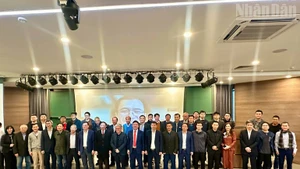This requires fundamental solutions to ensure fairness, safety and efficiency in research, while promoting sustainable development in the academic and creative environment.
A right-hand man
Experts point out that subjectivity, multi-methodology and emphasis on context are prominent features in the process of collecting, analysing and interpreting data in social science research. Therefore, humans always play a central role in social sciences, and the application of artificial intelligence in this field also has its own characteristics, more complex than in the exact sciences. AI not only plays the role of a supporting tool, but has also become a research object of the social sciences and humanities.
Dr. Pham Si An from the Viet Nam Academy of Social Sciences commented: One of the reasons why artificial intelligence has become an attractive tool for social sciences and humanities researchers is the ability to process large amounts of unstructured data such as text, audio, images–common data types in fields such as history, linguistics, anthropology or cultural studies.
Currently, neuro-linguistic programming (NLP) tools can support the extraction of information from millions of articles, archaeological documents, interview transcripts or social media posts, helping researchers detect patterns, analyse trends and make policy recommendations.
AI also supports the automation of many stages in the research process such as encoding qualitative data, analysing topics, classifying opinions or building models to predict social behaviour; supporting researchers to solve questions beyond the limits of traditional methods.
Specifically in the field of history, AI is contributing to the digitization and recognition of ancient documents.
National Archives Centre I has applied AI to convert more than 80,000 pages of Nguyen Dynasty documents from Han and Nom characters into digital form, facilitating storage and search.
At Ho Chi Minh City National University, the NomNaOCR project has digitized thousands of pages of Han Nom documents, creating the largest dataset in Viet Nam for reference and research.
The University of Natural Sciences under National University in Ho Chi Minh City has also developed an automatic translation system from Nom to Quoc Ngu, integrating knowledge of culture, geography and language to increase accuracy.
In philosophy research and teaching, many universities have proactively applied AI to support students and lecturers. A typical example is TrietGPT - a virtual assistant developed by Associate Professor, Dr. Nguyen Hoang Hai from National University in Ha Noi, capable of interpreting abstract concepts, suggesting depth of perception for learners and researchers. In addition, many lecturers have tested AI tools such as ChatGPT, Bing AI or Google Gemini to prepare lesson plans and build philosophical discussion content.
Many universities in Ho Chi Minh City have organised workshops and training courses on AI for lecturers, students and researchers. The Ho Chi Minh National Academy of Politics is also testing the application of AI in teaching.
Similarly, in the fields of archaeology, anthropology, cultural studies and regional development studies, AI is being applied to analyse images, videos, sounds and texts collected from local communities; through which, researchers can identify behavioural patterns, social organisation models and specific cultural characteristics.
AI algorithms support the analysis of informal languages, patterns, symbols, graphics in festivals, religious rituals, and helping to compare similarities and differences between population groups in the same geographical area.
AI also helps identify clusters of local economic activities or vulnerable social areas, supporting planners in identifying priority areas for policy intervention.
Dr. Hoang Hong Hiep from the Institute of Social Sciences of the Central and Central Highlands Region said: “Environmental research and monitoring work benefits greatly from AI, through the ability to analyse data from sensors, monitoring stations and satellite images. AI can predict floods and landslides early with high accuracy, thereby optimizing evacuation and relief distribution.”
Challenges and solutions
It is clear that AI is changing the research environment of social sciences and humanities, with far-reaching impacts such as enhancing the ability to collect and process data, discovering new problems and hypotheses, improving the effectiveness of quantitative and qualitative analysis, as well as supporting social policy design. However, the application of AI in research also raises many noteworthy issues.
First of all, the risk of dependence on technology. The misuse of AI can make researchers dependent on pre-existing biases in data warehouses, reducing the ability to reason, think critically and humanely–the core elements of social sciences. In addition, experts warn of a number of other challenges such as: the gap in technological capacity among researchers, the lack of open data platforms and interdisciplinary connections, as well as ethical and copyright issues in the use of AI.
At the scientific conference themed “Application of artificial intelligence: Opportunities and challenges for social science research in Viet Nam today”, Dr. Kieu Thanh Nga from the Institute of South Asian, West Asian and African Studies, Viet Nam Academy of Social Sciences emphasised: As a leading research institution in the field of social sciences, the VASS needs to take proactive actions to adapt to the AI era; urgently develop a medium- and long-term development strategy, associated with the goal of integrating AI technology into the entire research cycle; promote training and fostering digital capacity for the research team, narrowing the digital skills gap; and develop digital infrastructure to meet the requirements of data storage, analysis and sharing. In addition, VASS also needs to develop a set of academic ethics in the AI era, clearly defining the responsibility of researchers in checking and verifying results generated by AI.
In Viet Nam, current laws mainly regulate technological-technical aspects, and there are no separate regulations for specific issues in social science and humanities research. While technology industries focus on efficiency and optimization, social sciences are associated with ethics, culture and human rights. Therefore, AI, with its automation and dependence on big data, can pose risks if there is a lack of appropriate control mechanisms.
According to Dr. Pham Thuy Nga from the Institute of State and Law - VASS, notable legal issues include: protection of personal data in surveys of vulnerable groups, liability when AI causes bias, intellectual property rights for AI-supported products, lack of transparency in closed AI models, and ethical risks when abusing AI to create academic content.
Completing the legal framework for the application of AI in social sciences and humanities research is becoming an urgent requirement, ensuring that technology is developed within the framework of the rule of law, respecting humanistic values, and serving the community. This is also the basis for promoting advanced, modern, and sustainable science, in accordance with the spirit of Resolution No.57 of the Politburo on breakthroughs, development of science, technology, innovation, and national digital transformation.
















